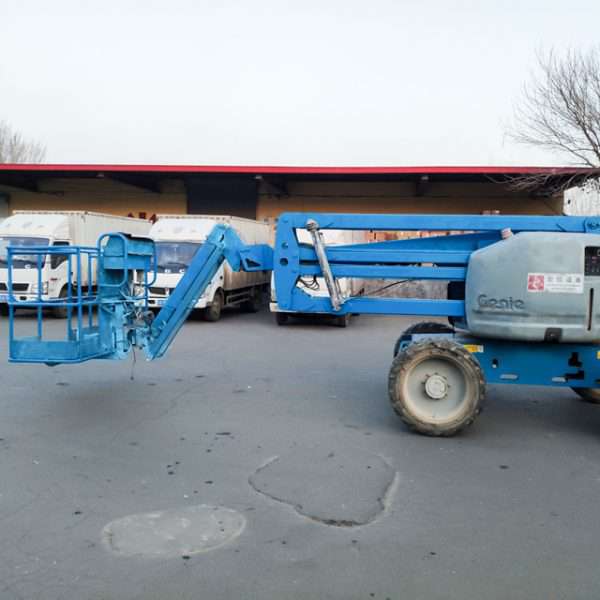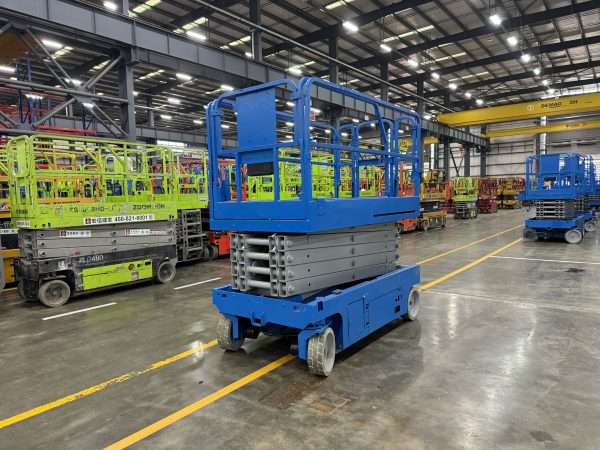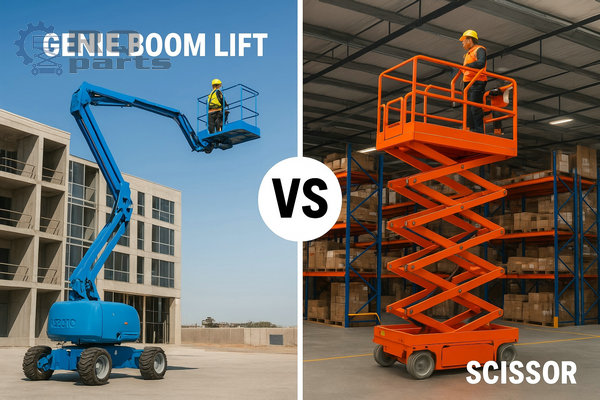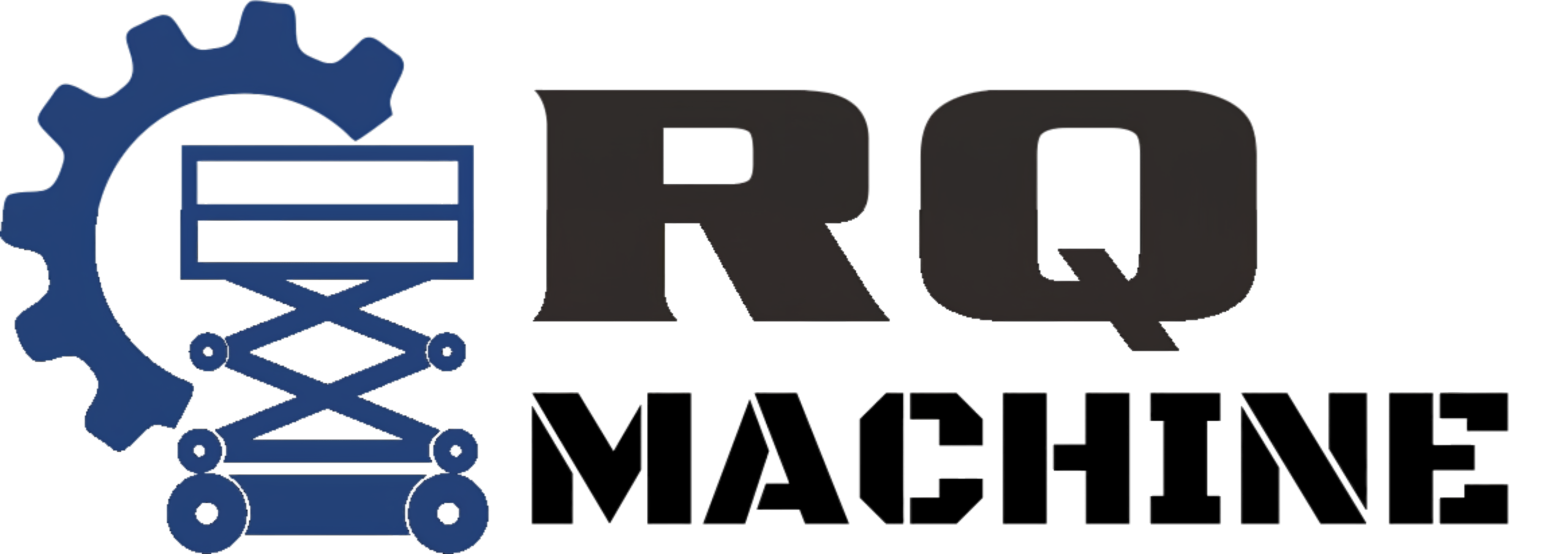Comparing Aerial Lift Options: Genie Boom Lifts vs. Scissor Lifts
2025-10-15
Aerial work platforms (AWPs) have become indispensable equipment in modern construction, equipment installation, maintenance, and industrial operations.
However, there are numerous types of platforms available on the market, with the two most common being the Genie boom lift and the scissor lift.
For procurement managers, general contractors, and rental companies, a core question remains:
“Which is better for my project, a Genie boom lift or a scissor lift?”
This article, written by the professional team at RQ Machines, systematically compares the two types of platforms from multiple perspectives: performance, application scenarios, safety, cost, maintenance, and purchasing recommendations, helping you make the best purchasing decision.
Product Overview and Structural Differences
1. Genie Boom Lift
Genie is one of the world’s leading brands of aerial work equipment. Its boom platforms are known for their high flexibility, strong reach, and wide operating range.

Used Genie Z45/25JRT Boom Lift
Based on the boom structure, they can be categorized as follows:
- Telescopic Boom Lift: The boom extends linearly, suitable for long-distance horizontal work.
- Articulating Boom Lift: The boom folds and bends, easily avoiding obstacles and suitable for confined or complex working environments.
These platforms typically use a hydraulic drive system and are suitable for aerial work in locations such as construction sites, bridges, docks, shipyards, and petrochemical facilities.
2. Scissor Lift
Scissor lifts utilize a cross-shaped structure (scissor arms) to achieve vertical lift height. They offer a large platform, high load capacity, and ease of operation. Its main advantages are stable structure and high safety, which makes it very suitable for vertical operation scenarios such as warehousing, logistics centers, indoor maintenance, installation or exhibition hall layout.

Used Genie GS3246 Scissor Lift
Genie Boom Lifts vs. Scissor Lifts: A Deep Dive Comparison Across Six Core Dimensions
Understanding the “DNA” of the equipment is the first step in decision-making. Genie boom lifts and scissor lifts have fundamental differences in their design principles and core functions.
Here is a professional comparison of the two equipment types, providing quantifiable data for your decision-making process.
Flexibility and Reach: The Core Competence of Boom Lifts
The “multi-section boom” design of Genie boom lifts is their key differentiator. In substations, stadiums, or large industrial parks, the work area is often surrounded by complex equipment or structures. While a scissor lift must find a “clean” spot for vertical ascent, a boom lift can “reach over” from a distance, significantly saving time on equipment movement and repositioning. This directly translates to higher project efficiency.
Load Capacity and Platform Space: The Scissor Lift’s Advantage in Efficient Internal Operations
For internal projects requiring multiple workers operating simultaneously and carrying a large volume of materials, such as installing ceilings, lighting systems, or HVAC, the scissor lift’s wide work platform and high load capacity are unparalleled. It provides a safe and stable “aerial workbench,” reducing the need for material trips to the ground and boosting installation speed.
Drive System and Environmental Consideration: The Choice Between Electric and Fuel
- Scissor Lifts: The vast majority are Electric DC type, offering zero emissions and low noise, making them the preferred choice for indoor work.
- Boom Lifts: Available in Fuel (Diesel) and Hybrid models to handle long-duration, high-power rough-terrain outdoor work; Genie also offers all-electric boom lifts for a balance of environmental friendliness and performance.
Application Scenarios

Genie Boom Lift – For Complex and Outdoor Operations
Typical applications:
-
Building façade installation and painting
-
Bridge and tunnel inspection
-
Petrochemical plant maintenance
-
Shipyard and port machinery work
-
Outdoor advertising and lighting
Advantages:
- Can work around obstacles and over structures
- Wide horizontal and vertical reach
- Ideal for high-level, complex projects
Scissor Lift – For Indoor and Vertical Work
Typical applications:
-
Warehouse and logistics operations
-
Electrical and lighting maintenance
-
Exhibition and shopping mall setup
-
Airport or station maintenance
Advantages:
- Simple vertical lifting with high stability
- Large platform and higher load capacity
- Quiet, zero-emission electric operation – ideal for indoor environments
Professional Decision Considerations: ROI, Safety, and Market Trends
Return on Investment (ROI) Analysis: Purchase Cost and Long-Term Value
Equipment cost isn’t the only metric; long-term holding costs are crucial.
Scissor-type platforms (low initial cost, high turnover): In the rental market, scissor-type platforms typically have higher turnover rates than boom-type platforms due to their high versatility and ease of maintenance. For renters, this means faster capital recovery; for users, the rental price is relatively low, making them suitable for short-term, high-frequency, standard projects.
Genie boom-type platforms (high residual value, low failure rate): As a major international brand, Genie boom-type platforms offer higher residual value. While the initial purchase or rental cost is high, their superior quality ensures an extremely low failure rate, reducing downtime. In specialized, complex, and high-profit projects (such as the oil and aviation industries), their high efficiency and low risk can quickly offset the higher costs.
ROI =Leasing/Purchase Cost Project Revenue − (Leasing/Purchase Cost + Maintenance Fees + Safety Training Fees) ×100%
Safety and Operational Compliance: The Non-Negotiable Bottom Line
Safety is the lifeline of any aerial work platform.
Genie Boom: Equipped with advanced platform load sensing technology, tilt sensors, and an automatic leveling system. Genie products are certified to stringent global safety standards, including the latest guardrail and control system designs, which effectively prevent the risks of misoperation and overloading.
Scissor: While the platform area is large, it must be used on relatively flat ground to prevent rollover. Many modern scissor platforms are equipped with pothole protection systems to address unexpected situations with uneven indoor floors.
Pro Tip: Regardless of the equipment you choose, be sure to require the supplier to provide a complete operating manual, regular maintenance records, and professional operator training certified by TÜV or relevant agencies.
Market Trends and Rental Models (Focus on 2025 and Beyond)
According to industry reports (e.g., 2.1, 2.2), the aerial work platform rental market is experiencing rapid growth.
Rental Concentration: The concentration of leading rental providers continues to increase, which means that specialized service, maintenance standards, and equipment upgrades will be more frequent.
Electrification and Intelligence: Market demand for electrification and hybrid powertrains has increased significantly, especially in urban and indoor projects. Brands such as Genie are actively investing in research and development to ensure their boom and scissor platforms maintain their leadership in zero emissions and low noise levels.
Digital Management: Internet of Things (IoT) technologies such as remote diagnostics, GPS positioning, and equipment usage data analysis will become standard. This will be crucial for optimizing rental equipment scheduling and preventative maintenance.
Genie Brand Advantages: Reasons for Choosing International Standards
When comparing boom and scissor platforms, choosing a reliable brand is crucial.
Genie: The “Quality Standard” in Aerial Work
Choosing Genie means choosing more than just a piece of equipment; it means choosing a world-class safety system and technical support.
Technological Innovation: Genie has long maintained advantages in articulated boom platform technology, such as its unique capacity zoning technology, which maximizes platform load utilization at different working heights and ranges.
Global Service Network: With its extensive global service network, Genie ensures genuine parts, professional repairs, and rapid response, both in China and around the world, significantly reducing the worry of equipment maintenance.
High Second-Hand Residual Value: Genie equipment’s excellent brand reputation and durability give it a high residual value in the second-hand market, effectively reducing the equipment’s lifecycle cost.
Rental and Purchase Recommendations: Considering Brand and Needs
If your project requirements are highly variable and frequently involve navigating obstacles and working at extreme heights, we strongly recommend renting or purchasing a Genie boom lift. Its superior performance will ensure the efficient completion of complex projects.
If your project requirements focus on vertical lift, high load requirements, and a flat site: a scissor lift is a cost-effective solution. Choose an electric scissor lift from Genie or an equivalent international brand to ensure maximum safety and maintenance efficiency.
RQ Machines – Professional Aerial Work Platform Supplier
As a leading aerial lift and equipment supplier in China, RQ Machines provides high-performance, reliable, and safe lifting solutions to clients worldwide.
Our product range includes:
-
Boom Lifts (Articulating & Telescopic)
-
Scissor Lifts (Electric & Diesel)
-
Aluminum Aerial Lifts & Trailer Lifts
-
Customized Work Platforms & Spare Parts
Why Choose RQ Machines
-
Manufacturer & authorized distributor – OEM/ODM available
-
CE & ISO certified quality
-
Global export to Europe, Southeast Asia, Middle East, South America
-
Fast delivery and professional after-sales support
📞 Contact Us for Quotation & Model Selection:
-
Email: sales@rq-parts.com
-
Website: www.rqmachines.com
-
WhatsApp: +86-18221399269
Get expert consultation from RQ Machines engineers today and find the ideal lift for your next project.
How to Choose Between Genie Boom Lift and Scissor Lift
| Project Type | Recommended Platform |
|---|---|
| Large outdoor high-reach operations | Genie Boom Lift |
| Indoor maintenance or warehouse tasks | Scissor Lift |
| Cost-sensitive projects | Electric Scissor Lift |
| Complex terrains and tall buildings | Articulating Genie Lift |
Choosing the right aerial work platform improves productivity, safety, and overall project efficiency.
RQ Machines is committed to providing customers with high-quality lifting solutions and reliable long-term support.
FAQ
Q1: Is there a big price difference between Genie Boom Lift and Scissor Lift?
Yes. Genie Boom Lifts generally range from USD 30,000–100,000, while Scissor Lifts typically cost USD 10,000–40,000 depending on model and configuration.
Q2: Does RQ Machines provide customized solutions?
Absolutely. We can customize height, load capacity, and power type to meet specific project needs.
Q3: What’s the usual delivery time?
Standard models are delivered within 15–30 days, while custom units may vary.
Q4: Do you offer operator training and after-sales support?
Yes. RQ Machines provides full technical training, maintenance guidance, and spare parts supply.
Conclusion
Choosing an aerial work platform isn’t a simple “either-or” decision. Genie boom platforms, with their flexible spanning capabilities and extreme heights, are designed for complex, non-vertical work. Scissor platforms, with their vertical efficiency, large payload capacity, and economical performance, are a solid foundation for interior renovations and standard maintenance.
The ultimate decision should be based on a comprehensive consideration of project conditions, budget, operating environment, and safety compliance. We recommend contacting a professional Genie authorized dealer or rental company for a site survey and needs analysis to ensure your chosen aerial platform delivers the highest efficiency and safety returns for your project.
